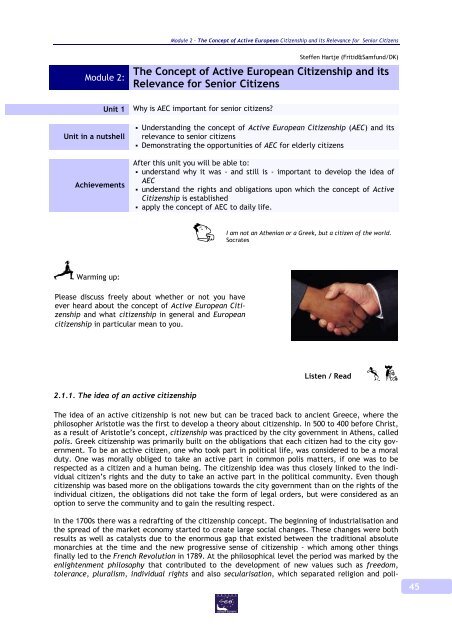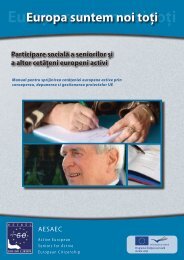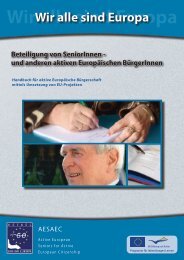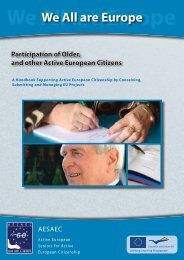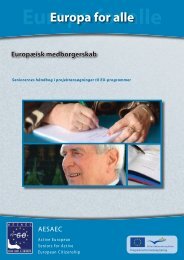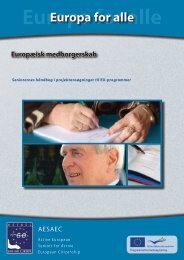We All are Europe - AESAEC
We All are Europe - AESAEC
We All are Europe - AESAEC
You also want an ePaper? Increase the reach of your titles
YUMPU automatically turns print PDFs into web optimized ePapers that Google loves.
Module 2 – The Concept of Active <strong>Europe</strong>an Citizenship and its Relevance for Senior Citizens<br />
Module 2:<br />
Steffen Hartje (Fritid&Samfund/DK)<br />
The Concept of Active <strong>Europe</strong>an Citizenship and its<br />
Relevance for Senior Citizens<br />
Unit 1<br />
Unit in a nutshell<br />
Achievements<br />
Why is AEC important for senior citizens<br />
Understanding the concept of Active <strong>Europe</strong>an Citizenship (AEC) and its<br />
relevance to senior citizens<br />
Demonstrating the opportunities of AEC for elderly citizens<br />
After this unit you will be able to:<br />
understand why it was - and still is - important to develop the idea of<br />
AEC<br />
understand the rights and obligations upon which the concept of Active<br />
Citizenship is established<br />
apply the concept of AEC to daily life.<br />
I am not an Athenian or a Greek, but a citizen of the world.<br />
Socrates<br />
Warming up:<br />
Please discuss freely about whether or not you have<br />
ever heard about the concept of Active <strong>Europe</strong>an Citizenship<br />
and what citizenship in general and <strong>Europe</strong>an<br />
citizenship in particular mean to you.<br />
Listen / Read<br />
2.1.1. The idea of an active citizenship<br />
The idea of an active citizenship is not new but can be traced back to ancient Greece, where the<br />
philosopher Aristotle was the first to develop a theory about citizenship. In 500 to 400 before Christ,<br />
as a result of Aristotle’s concept, citizenship was practiced by the city government in Athens, called<br />
polis. Greek citizenship was primarily built on the obligations that each citizen had to the city government.<br />
To be an active citizen, one who took part in political life, was considered to be a moral<br />
duty. One was morally obliged to take an active part in common polis matters, if one was to be<br />
respected as a citizen and a human being. The citizenship idea was thus closely linked to the individual<br />
citizen’s rights and the duty to take an active part in the political community. Even though<br />
citizenship was based more on the obligations towards the city government than on the rights of the<br />
individual citizen, the obligations did not take the form of legal orders, but were considered as an<br />
option to serve the community and to gain the resulting respect.<br />
In the 1700s there was a redrafting of the citizenship concept. The beginning of industrialisation and<br />
the spread of the market economy started to create large social changes. These changes were both<br />
results as well as catalysts due to the enormous gap that existed between the traditional absolute<br />
monarchies at the time and the new progressive sense of citizenship - which among other things<br />
finally led to the French Revolution in 1789. At the philosophical level the period was marked by the<br />
enlightenment philosophy that contributed to the development of new values such as freedom,<br />
tolerance, pluralism, individual rights and also secularisation, which separated religion and poli-<br />
45


